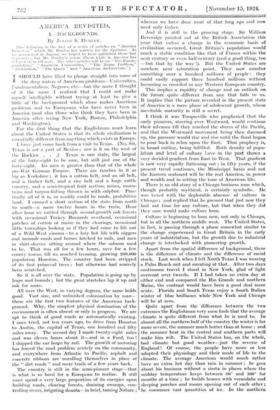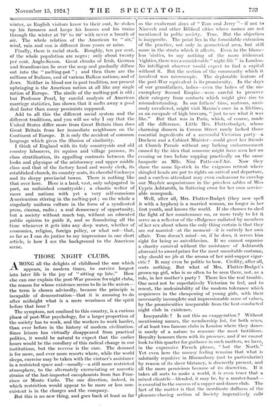A3IER ICA REVISITED.
(Tiff, following is the first of a series of articles on " America Hex-Hied " which Mr. Huxley has written for the Spectator. As \ it i1/101.1 iced in August, we hoped to have published them last but Mr. Buxley's severe illness while in America has i;,.layp,1 thorn till now. The other articles will be on "The Funda- inent,t1h4:4," " American Universities," " The Negro Problem," Prohibition," " The Quota " and " American Architecture.") T SHOULD have liked to plunge straight into some of the deep waters of American problems—Universities, undamentalism, Negroes, etc.—but the more I thought of it the more I realized that I could not make myself intelligible without trying at least to give a little of the background which alone makes American problems real to Europeans who have never been in America (and also those who think they have been in America after seeing New York, Boston, Philadelphia and Washington).
For the first thing that the Englishman must learn about the United States is that its whole civilization is essentially different from anything which exists in Europe.
I have just come back from a visit to Texas. (No, Sir, Texas is not a part of Mexico ; nor is it on the west of the Rockies . . .) Texas is one state, the largest of the forty-eight to be sure, but still just one of the forty-eight. Its area is greater than that of the whole pre-War German Empire. There are ranches in it as big as Yorkshire ; it has a cotton belt, and an oil belt, and a timber belt, and a rice belt and a huge cattle country, and a semi-tropical fruit section, mines, moun- tains and tarpon-fishing thrown in with sulphur. Prac- tically all of it is, or readily could be made, prohibitive land. I crossed a short section of the state from north to south—a mere twelve hours in the train. Hour after hour we rattled through second-growth oak forests with occasional Turkey Buzzards overhead, occasional patches of cotton or maize in the clearings, occasional little townships looking as if they had come to life out of a Wild West cinema—to a lazy hot life with niggers and unmade roads and horses hitched to rails, and men in shirt-sleeves sitting around where the saloons used to be. That was all for a few hours, save for a few county towns, till we reached teeming, growing 200,000 population Houston. The country had been stripped of its first primeval trees ; but otherwise had scarcely been scratched.
So it is all over the state. Population is going up by leaps and bounds ; but the great stretches lap it up and ask for more.
All over the West, in varying degrees, the same holds good. Vast size, and unfinished colonization by man— those are the first two features of the American back- ground. Why, the simplest physical domination of the environment is often absent or only in progress. We are apt to think of -good roads as automatically existing. I once tried, not ten years ago, to drive from Houston to Austin, the capital of Texas, one hundred and fifty miles away. The second day I made twenty-eight miles and was eleven hours about it—and in a Ford, .too ! I shipped the car home by rail. The growth of motoring has forced the road problem acutely on the community, and everywhere from Atlantic to Pacific, asphalt and concrete ribbons are unrolling themselves in place of the " dirt roads " and mere trails of a few years back.
The country is still in the semi-pioneer stage—that is what is so hard for a European to realize. It still must spend a very large proportion of its energies upon building roads, clearing forests, draining swamps, con- trolling rivers, irrigating deserts—in brief, taming Nature ; whereas we have done most Of that long agd and now need only tinker.
And it is still in the growing stage. Sir William Beveridge pointed out at the British Association this year that unless a change in the economic basis of civilization occurred, Great Britain's population would reach a stable condition like that of France within the next century or even half-century (and a good thing, too —but that by the way !). But the United States are nowhere near saturation point. They now number something over a hundred millions of people : they could easily support three hundred millions without becoming as crowded as any Western European country.
This implies a rapidity of change and an outlook on the future quite different from any that falls to us. It implies that the picture revealed in the present state of America is a mere phase of adolescent growth, whose inevitable maturity is still a secret.
I think it was Tocqueville who prophesied that the early pioneers, steering ever Westward, would continue their advance till they reached the shores of the Pacific, and that the Westward movement being then dammed up, the pressure would rise and rise until the flood began to pour back in relux upon the East. That prophecy is, in broad outline, being fulfilled. Both density of popu- lation and level of culture Lave in the past shown a very decided gradient from East to West. That gradient is now very rapidly flattening out ; in fifty years, if the present trend continues, the Mississippi basin and not the Eastern seaboard will be the real America, in power and wealth and in setting the tone of American life.
There is an old story of a Chicago business man which, though probably mythical, is certainly symbolic. He was taxed with the deplorable absence of • culture in Chicago ; and replied that he guessed that just now they had not time for any culture, but that when they did they sure would make culture hum.
Culture is beginning to hum now, not only in Chicago, but in all the northern middle west. The United States, in fact, is passing through a phase somewhat similar to the change experienced in Great Britain in the early years of industrialism, but the growth due to industrial change is interlocked with pioneering growth.
Apart from the spatial difference of background, there is the difference of climate and the difference of racial stock. Last week when I left North Texas I was wearing a Palm Beach suit and sweating at that. After two days continuous travel I stood in New York, glad of light overcoat over tweeds. If I had taken an extra day at either end and compared the Rio Grande and northern Maine, the contrast would have been a good deal more acute. Florida and South Texas enjoy a South Italian winter of blue brilliance while' New York and Chicago will be at zero.
Quite apart from the difference between the two extremes the Englishman very soon finds that the average climate is quite different from what he is used to. In almost all the northern half of the country the winter is far more severe, the summer much hotter than at home ; and the summer heat in the central and southern parts will make him wilt. The United States has, on the whole, bad climate but good weather—just the reverse of England ! Of course, the people have more or less adapted their physiology and their mode of life to the climate. The average American would much rather have an extra hot day than rain in summer ; he goes about his business without a siesta in places where the midday temperature keeps between 80° and 100° for months at a time ; he builds houses with verandahs and sleeping porches and rooms opening out of each other ; he consumes vast quantities of ice. In the northern winter, as English visitors know to their cost, he stokes up his furnaces and keeps his houses and his trains through the winter at 70° to SW with never a breath of air. The whole relation of the American to " air," wind, rain and sun is different from yours or mine.
Finally, there is racial stock. Roughly, ten per cent. Of the whole population are negro ; only about twenty pei cent. Anglo-Saxon. Great chunks of Irish, German and Scandinavian lie over the map and gradually diffuse out into the " melting-pot " ; and then there are the millions of Italians, and of various Balkan nations; and of Jews. Neither in blood nor in past tradition, nor present upbringing is the American nation at all like any single nation of Europe. The simile of the melting-pot is old ; but Professor Pearl, by careful analysis of American marriage statistics, has shown that it melts away a good deal faster than many pessimists supposed.
Add to all this the different social system and the different traditions, and you will see why I say that the United States differ more from Great Britain than does Great Britain from her immediate neighbours on the Continent of Europe. It is only the accident of common language which gives the illusion of similarity.
I think of England with its tidy countryside and old country labourers, its squires and village parsons, its class stratification, its appalling contrasts between the looks and physique of the aristocracy and upper middle class and that of the factory hand and weedy clerk, its established church, its country seats, its cheerful Cockneys and its sleepy provincial towns. There is nothing like that over here. Here is a land, vast, only subjugated in part, an unfinished countryside ; a chaotic welter of races and nations with yet a very self-conscious Americanism stirring in the melting-pot ; on the whole a singularly uniform culture in the form of a syndicated press, cinema, radio ; a real democracy of opportunity, but a society without much top, without an educated public opinion to guide it, and so floundering all the time whenever it gets into any deep water, whether of economics, religion, foreign policy, or what not—that, so far as I can do justice to my impressions in one short article, is how I see the background to the American scene.











































 Previous page
Previous page